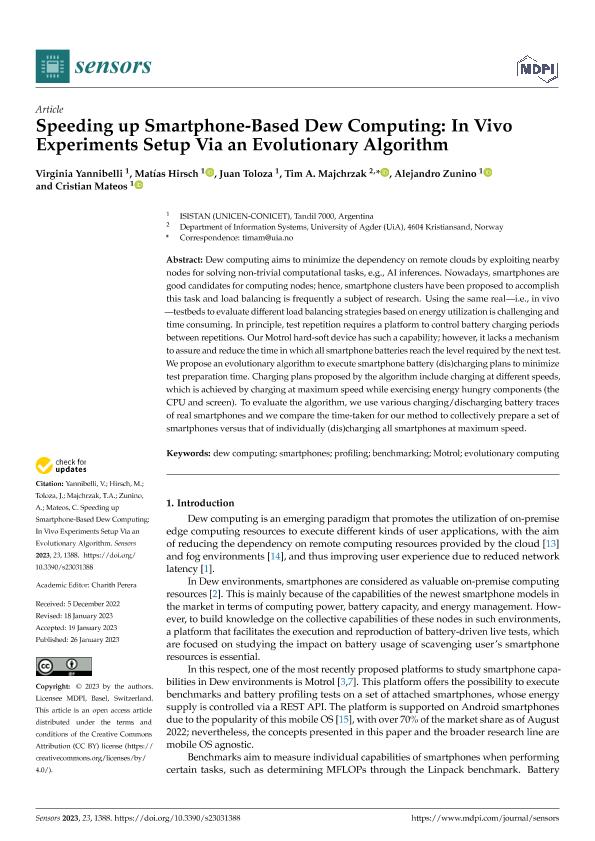Artículo
Speeding up Smartphone-Based Dew Computing: In Vivo Experiments Setup Via an Evolutionary Algorithm
Yannibelli, Virginia Daniela ; Hirsch Jofré, Matías Eberardo
; Hirsch Jofré, Matías Eberardo ; Toloza, Juan Manuel
; Toloza, Juan Manuel ; Majchrzak, Tim A.; Zunino Suarez, Alejandro Octavio
; Majchrzak, Tim A.; Zunino Suarez, Alejandro Octavio ; Mateos Diaz, Cristian Maximiliano
; Mateos Diaz, Cristian Maximiliano
 ; Hirsch Jofré, Matías Eberardo
; Hirsch Jofré, Matías Eberardo ; Toloza, Juan Manuel
; Toloza, Juan Manuel ; Majchrzak, Tim A.; Zunino Suarez, Alejandro Octavio
; Majchrzak, Tim A.; Zunino Suarez, Alejandro Octavio ; Mateos Diaz, Cristian Maximiliano
; Mateos Diaz, Cristian Maximiliano
Fecha de publicación:
02/2023
Editorial:
Molecular Diversity Preservation International
Revista:
Sensors
ISSN:
1424-8220
Idioma:
Inglés
Tipo de recurso:
Artículo publicado
Clasificación temática:
Resumen
Dew computing aims to minimize the dependency on remote clouds by exploiting nearby nodes for solving non-trivial computational tasks, e.g., AI inferences. Nowadays, smartphones are good candidates for computing nodes; hence, smartphone clusters have been proposed to accomplish this task and load balancing is frequently a subject of research. Using the same real—i.e., in vivo—testbeds to evaluate different load balancing strategies based on energy utilization is challenging and time consuming. In principle, test repetition requires a platform to control battery charging periods between repetitions. Our Motrol hard-soft device has such a capability; however, it lacks a mechanism to assure and reduce the time in which all smartphone batteries reach the level required by the next test. We propose an evolutionary algorithm to execute smartphone battery (dis)charging plans to minimize test preparation time. Charging plans proposed by the algorithm include charging at different speeds, which is achieved by charging at maximum speed while exercising energy hungry components (the CPU and screen). To evaluate the algorithm, we use various charging/discharging battery traces of real smartphones and we compare the time-taken for our method to collectively prepare a set of smartphones versus that of individually (dis)charging all smartphones at maximum speed.
Palabras clave:
BENCHMARKING
,
DEW COMPUTING
,
EVOLUTIONARY COMPUTING
,
MOTROL
,
PROFILING
,
SMARTPHONES
Archivos asociados
Licencia
Identificadores
Colecciones
Articulos(ISISTAN)
Articulos de INSTITUTO SUPERIOR DE INGENIERIA DEL SOFTWARE
Articulos de INSTITUTO SUPERIOR DE INGENIERIA DEL SOFTWARE
Citación
Yannibelli, Virginia Daniela; Hirsch Jofré, Matías Eberardo; Toloza, Juan Manuel; Majchrzak, Tim A.; Zunino Suarez, Alejandro Octavio; et al.; Speeding up Smartphone-Based Dew Computing: In Vivo Experiments Setup Via an Evolutionary Algorithm; Molecular Diversity Preservation International; Sensors; 23; 3; 2-2023; 1-22
Compartir
Altmétricas



